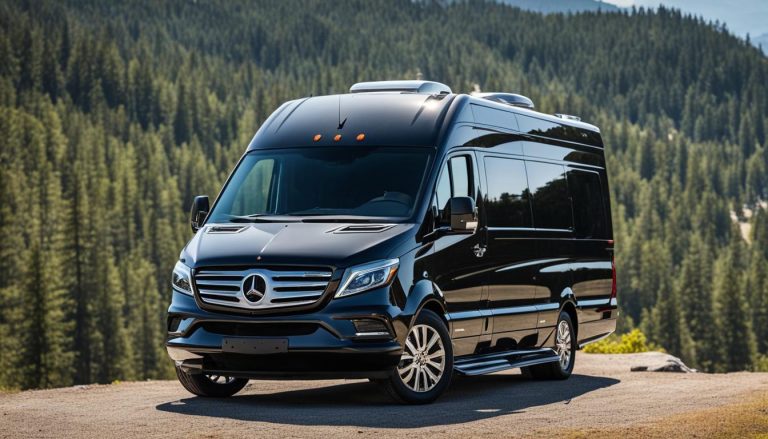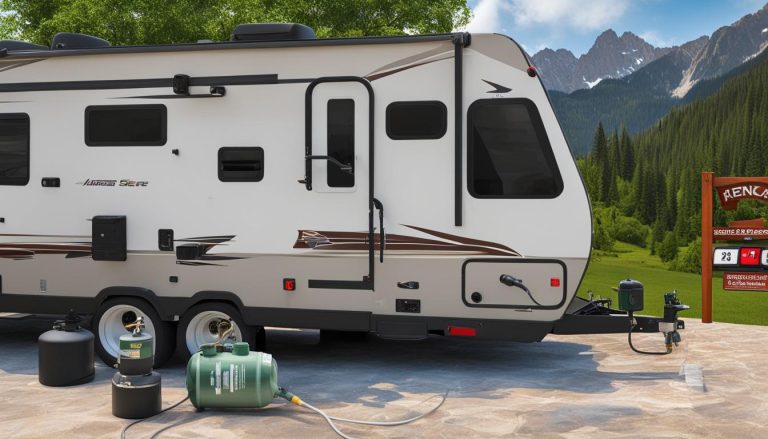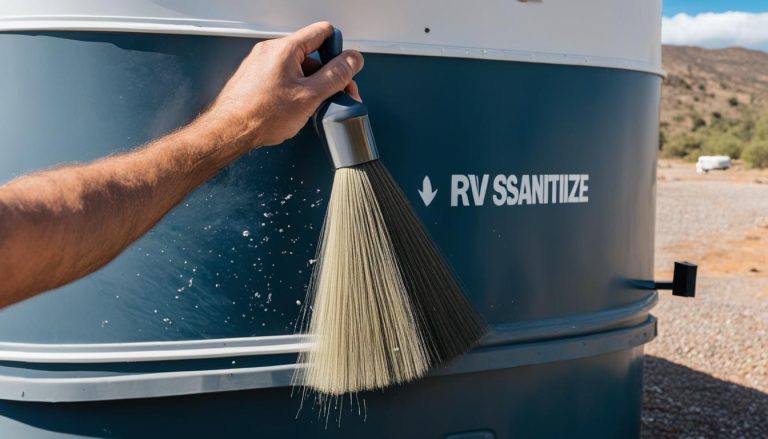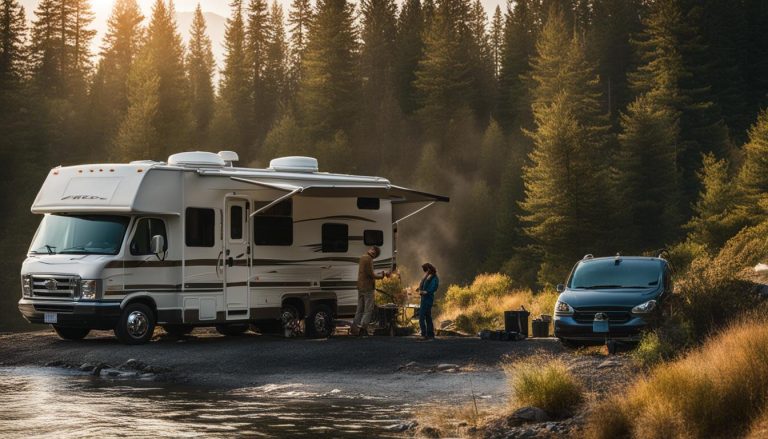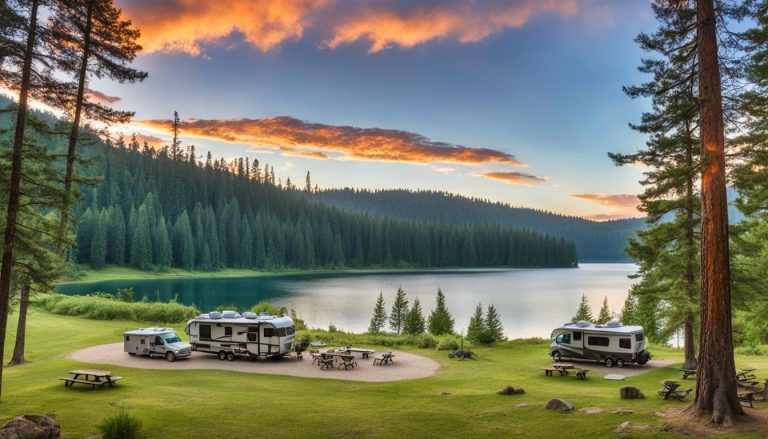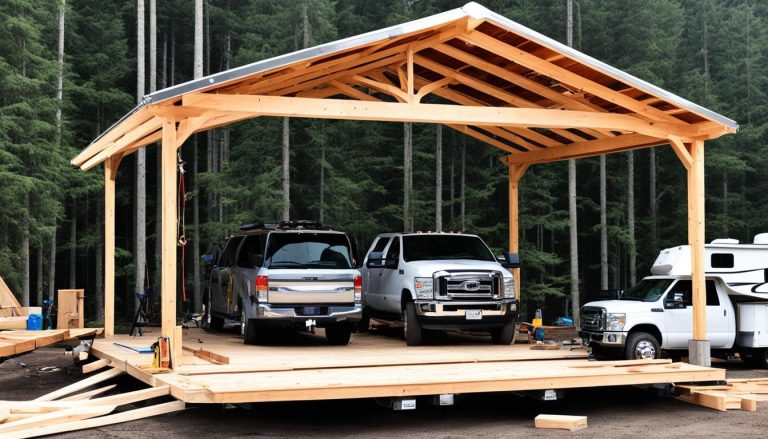Explore RV Camping Spots Easily – Quick Guide
gorvlifestyle.com and its partners may earn a commission if you purchase a product through one of our links
RV parks, also known as campgrounds, are the go-to choice for many travelers in search of a comfortable and convenient place to stay in their RVs. These parks offer various amenities and services catered to RVers, making them an ideal option for both short-term and long-term stays.
RV parks accommodate different types of travelers, including families, vacationers, working travelers, and retired travelers. The amenities offered at RV parks can vary, ranging from basic electrical hookups to luxury facilities with swimming pools, fitness rooms, and on-site repairs.
The cost to stay at an RV park can also vary based on the location and the amenities provided. Daily, weekly, and monthly rates are common, with additional fees for extras like pets or cable TV.
To find the best RV park for your needs, consider your preferences for amenities, location, and the size of your RV. Websites like Campendium can help you search for RV parks based on hookups, recreation options, and price. Additionally, discount and membership clubs like Passport America and Good Sam can provide you with reduced rates at participating campgrounds.
Key Takeaways:
- RV parks are the preferred choice for many RV travelers due to their amenities and services.
- Consider your preferences for amenities, location, and RV size when selecting an RV park.
- Websites like Campendium can help you find RV parks based on specific criteria.
- Discount and membership clubs like Passport America and Good Sam offer reduced rates at participating campgrounds.
- Researching the amenities and pricing of different RV parks can help you find the best one for your needs.
What is Boondocking?
Boondocking, also known as dry camping, wild camping, or primitive camping, is a form of off-grid camping that doesn’t rely on commercial services like water, power, or sewer hookups. It offers a unique opportunity to disconnect from civilization and enjoy nature in more remote and secluded areas.
Boondocking can take place in various settings, including off-the-grid locations in nature or even in parking lots while on a road trip. Some campgrounds also offer boondocking options with reduced rates for RVers who don’t require hookups.
When boondocking in nature, campers need to be self-reliant and prepared to gather their own resources, such as firewood, and use battery-powered lights.
Boondocking allows you to escape the hustle and bustle of crowded campgrounds and immerse yourself in the tranquility of nature. It’s a welcomed opportunity for adventure and solitude.
It’s important to note that boondocking is different from free camping, as some boondocking sites may still have fees associated with them.
To get started with boondocking, research the regulations and guidelines of the land you plan to camp on, and be sure to follow leave no trace principles to minimize your impact on the environment.
Benefits of Boondocking:
- Escape crowded campgrounds
- Immerse yourself in nature
- Enjoy solitude and peace
- Opportunity for unique adventures
Boondocking offers a sense of freedom and exploration, allowing you to create your own camping experiences in untouched wilderness.
Finding Free or Cheap RV Camping Sites on BLM Land
The Bureau of Land Management (BLM) manages vast areas of public land in the United States, offering numerous opportunities for free or cheap RV camping. To find camping sites on BLM land, start by visiting the BLM website or using platforms like Recreation.gov or Campendium. These resources allow you to search for camping sites based on location and amenities.
When boondocking on BLM land, it’s essential to be aware of the rules and regulations, including how long you can stay and any fire restrictions in place. Many BLM sites are first-come, first-served, so it’s helpful to have alternatives in mind in case a particular area is full. Additionally, consider the road conditions when accessing these sites, as some may require higher clearance or may be more suitable for smaller RVs. Boondocking on BLM land provides the opportunity to immerse yourself in nature and enjoy the freedom of camping without the amenities of a traditional campground.
For a better understanding, here is a comparison of camping options on BLM land:
| Free RV Camping Sites on BLM Land | Cheap RV Camping Sites on BLM Land |
|---|---|
|
|
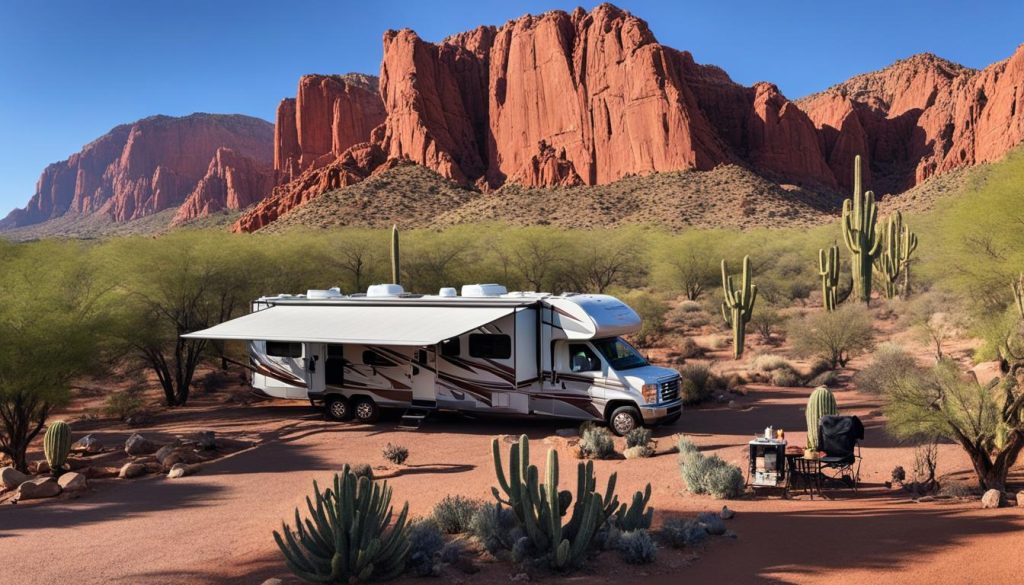
Exploring BLM land for free or cheap RV camping sites allows you to connect with nature, escape crowds, and enjoy the tranquility of the great outdoors. It’s a fantastic way to experience the beauty and freedom of camping while keeping your budget intact.
Finding Cheap or Free RV Camping Sites in National Forests or Grasslands
National forests and grasslands provide abundant opportunities for RVers seeking affordable camping sites amidst picturesque natural settings. With thousands of campgrounds spanning across the country, these public lands offer a chance to immerse yourself in nature while keeping your camping costs low. To find ideal camping sites in national forests or grasslands, consider utilizing the following resources:
- Benchmark Maps: These detailed atlases provide comprehensive information about public lands, campgrounds, and recreation attractions. Browse through these maps to locate suitable camping sites within national forests or grasslands.
- National Forest Service app: This app offers valuable information and maps specifically tailored for camping in national forests. It’s a handy tool to have on your phone to aid in your exploration.
- Ranger stations: Pay a visit to nearby ranger stations to get up-to-date information, recommendations, and current conditions for camping in specific areas within national forests or grasslands.
- ForestCamping.com: This website serves as a useful tool to assist you in locating and researching campgrounds within national forests. It provides detailed information about amenities, regulations, and highlights of each campground.
When planning to camp in national forests or grasslands, it’s crucial to familiarize yourself with any rules and regulations specific to the area. Pay attention to camping duration limits, fire restrictions, and guidelines for preserving the natural environment. Remember to practice “leave no trace” principles to ensure that these beautiful landscapes remain unspoiled for future visitors.
Now, take a moment to imagine waking up to the serene sounds of nature, surrounded by towering trees or vast grasslands. Picture yourself enjoying outdoor activities like hiking, fishing, or birdwatching, all within the tranquil setting of a national forest or grassland campground.
Experience the Beauty of National Forest Camping:
“Camping in national forests brings you closer to nature and allows you to experience the incredible beauty and tranquility of these untouched landscapes.” – RV Adventurer
So, pack your gear, fuel up your RV, and head to a national forest or grassland campground for an unforgettable adventure in the heart of nature.
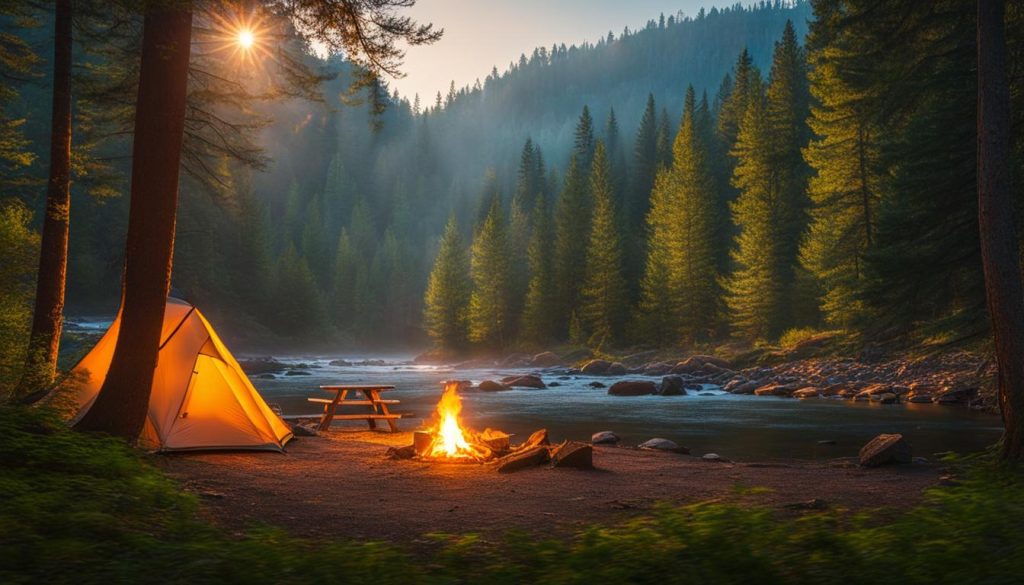
| Advantages | Considerations |
|---|---|
| 1. Affordable or free camping options | 1. Limited amenities compared to RV parks |
| 2. Stunning natural landscapes | 2. Camping duration limits |
| 3. Abundance of outdoor activities | 3. Potential fire restrictions |
| 4. Serene and peaceful surroundings | 4. Proximity to wildlife |
By exploring national forests and grasslands for your RV camping trips, you can enjoy affordable accommodation while basking in the natural wonders that these public lands have to offer.
Finding Cheap or Free RV Camping Sites run by the U.S. Army Corps of Engineers (COE)
When it comes to affordable RV camping options, don’t overlook the campgrounds managed by the U.S. Army Corps of Engineers (COE). With various locations across the United States, the COE offers a range of campgrounds that provide opportunities for cheap or even free RV camping.
To find these campgrounds, you can start by purchasing the “Camping with the Corps of Engineers” guide. This guide contains valuable information about the amenities, pricing, and booking process for each campground, helping you make informed decisions about your RV camping adventure.
Once you’ve identified a COE campground that aligns with your preferences, you can easily book your stay through the Recreation.gov website. This streamlined booking process ensures that securing your desired campsite is hassle-free.
It’s worth noting that some COE campgrounds offer discounts for certain groups, such as seniors, veterans, and other eligible individuals. When making your reservations, be sure to inquire about any available discounts, maximizing your savings on your RV camping experience.
Camping with the COE provides more than just affordability; you’ll also have access to beautiful locations with amenities like electrical hookups, picnic areas, and boat ramps. Whether you’re seeking a quiet lakeside retreat or the chance to explore nature’s wonders, COE campgrounds offer the perfect backdrop for your affordable RV camping adventure.
Finding Cheap or Free RV Camping Sites in National Parks
National parks are renowned for their stunning natural beauty, and many of them offer camping options for RVers. To make the most of your RV camping experience without breaking the bank, here are some tips for finding cheap or free camping sites in national parks.
1. Utilize Resources like Recreation.gov and the National Park Service Website
Recreation.gov and the National Park Service website are valuable resources for finding cheap or free RV camping sites in national parks. These platforms allow you to search for reservable campgrounds within national parks, providing you with information on availability, amenities, and fees. Some national parks offer free camping, while others may require campsite reservations with associated fees. By utilizing these resources, you can easily browse and compare camping options to find the best fit for your budget.
2. Be Mindful of Rules and Guidelines
When camping in national parks, it’s important to be aware of any rules and guidelines in place. These may include camping duration limits, reservation requirements, and specific restrictions regarding RV size and length of stay. By familiarizing yourself with the rules and guidelines, you can ensure a smooth and enjoyable camping experience without any unexpected surprises.
3. Plan Ahead
To secure a cheap or free RV camping site in a national park, it’s advisable to plan ahead. Popular national parks can fill up quickly, especially during peak seasons, so making reservations in advance is essential. By planning ahead, you can increase your chances of snagging a budget-friendly camping spot and avoid last-minute disappointment.
By following these tips and utilizing the resources available, you can find cheap or free RV camping sites in national parks. Experience the wonders of nature while enjoying affordable camping accommodations, and create unforgettable memories on your RV camping adventure.
Finding Cheap or Free RV Camping Sites in State Parks and State Forests
State parks and state forests are excellent options for RVers seeking affordable camping options. These natural areas provide opportunities to immerse yourself in the beauty of the outdoors while keeping your camping costs low. To find cheap or free RV camping sites in state parks and state forests, follow these steps:
- Search for the websites of specific state park systems
- Explore their camping options and available campgrounds
- Check for detailed information about amenities and reservation processes
- Look for any discounts offered to seniors, veterans, or residents
- Inquire about available discounts when making reservations
- Consider reading Wand’rly Magazine articles for insights and recommendations
- Be aware of any rules and regulations governing camping duration and specific amenities
Example: Discounts at State Parks
Some states offer discounts at their state parks, allowing you to save even more on your camping trip. For example, the California State Parks system offers a discounted Annual Day Use Pass for veterans. With this pass, veterans can enjoy access to numerous state parks and beaches for a reduced fee.
“Camping in state parks is a budget-friendly way to enjoy the great outdoors. I always make sure to check for any available discounts and promotions before making reservations. It’s a great way to save money while exploring beautiful natural areas.” – RV enthusiast
By taking advantage of state park camping, you can discover beautiful natural areas, enjoy various amenities, and keep your camping costs low. It’s the perfect way to experience the wonders of the great outdoors without breaking the bank.
Free Camping and Overnight RV Parking Apps and Websites
In addition to traditional campgrounds and public lands, there are various apps and websites that cater specifically to free camping and overnight RV parking. These resources provide valuable information on where you can camp for free or at a low cost, allowing you to save money while enjoying the freedom of the open road.
Here are some popular apps and websites that can help you find budget-friendly camping options:
- Togo RV Roadpass Pro: This app offers a comprehensive database of free and low-cost campgrounds across the United States. It provides detailed information on amenities, prices, and user reviews, making it easy to find the perfect spot for your RV.
- RV Trip Wizard: With RV Trip Wizard, you can plan your entire RV journey, including finding free or low-cost campsites along your route. This app provides campground information, driving directions, fuel stops, and more.
- Allstays Pro: Allstays Pro is a popular website and app that helps you locate free camping spots, overnight parking areas, and RV-friendly businesses. It covers a wide range of locations, including national forests, Walmarts, and casinos.
- Overnight RV Parking: This app focuses specifically on finding overnight parking options for RVs. It provides a database of businesses and locations that allow overnight stays, ensuring you have a safe and convenient place to rest for the night.
- Harvest Hosts: Harvest Hosts offers a unique camping experience by connecting RVers with wineries, farms, and other unique locations that allow overnight stays. In exchange, campers are encouraged to support the host business by purchasing their products.
- Boondockers Welcome: Boondockers Welcome is a community-driven website that connects RVers with homeowners who offer free overnight parking on their private property. It’s a great way to meet new people and support local communities while enjoying free camping.
- The Dyrt: The Dyrt is an app that provides a comprehensive database of campgrounds and public lands, including free and low-cost options. It also features user reviews and photos to help you make an informed decision about where to stay.
These apps and websites can be highly useful for finding hidden gems and off-the-beaten-path camping spots. Each platform offers unique features and benefits, so it’s worth exploring multiple options to find the one that best suits your needs. Whether you’re looking for a quick overnight stop or a longer stay, these resources can help you discover budget-friendly camping options while on your RV adventures.
Plan Your RV Camping Adventure
Now that you have a comprehensive understanding of how to find RV campsites, it’s time to plan your own RV camping adventure. Consider your preferences for location, amenities, and budget, and utilize the resources mentioned in this guide to find the best campsites for your needs.
As you plan your trip, don’t forget to take into account factors such as road conditions, duration limits, and any rules and regulations specific to each campground or public land. It’s important to be well-prepared and informed before embarking on your RV camping journey.
Before hitting the road, make sure your RV is ready for off-grid camping. Check that you have enough power, water, and waste storage for your planned stay. Being properly equipped will ensure a smooth and enjoyable camping experience.
Take advantage of the diverse landscapes and natural wonders across the United States, and embark on memorable RV camping experiences while saving money and immersing yourself in the beauty of the great outdoors. With proper planning and preparation, you can create lasting memories on your RV camping trip. Happy camping!
FAQ
How can I find RV campsites?
To find RV campsites, you can utilize websites like Campendium, which allows you to search for RV parks based on hookups, recreation options, and price. You can also consider joining discount and membership clubs like Passport America and Good Sam, which provide reduced rates at participating campgrounds.
Are there any apps or websites for finding free camping and overnight RV parking?
Yes, there are several resources available for finding free camping and overnight RV parking options. Apps and websites like Togo RV Roadpass Pro, RV Trip Wizard, Allstays Pro, Overnight RV Parking, Harvest Hosts, Boondockers Welcome, and The Dyrt provide information on campsites and parking spots based on location, amenities, and reviews from fellow campers.
What is boondocking?
Boondocking, also known as dry camping, wild camping, or primitive camping, is a form of off-grid camping that doesn’t rely on commercial services like water, power, or sewer hookups. It offers the opportunity to disconnect from civilization and enjoy nature in more remote and secluded areas.
How do I find free or cheap RV camping sites on BLM land?
To find camping sites on Bureau of Land Management (BLM) land, you can start by visiting the BLM website or using platforms like Recreation.gov and Campendium. These resources allow you to search for camping sites based on location and amenities.
How can I find cheap or free RV camping sites in national forests or grasslands?
To find camping sites in national forests or grasslands, you can utilize resources like Benchmark Maps, the National Forest Service app, and websites like ForestCamping.com. These platforms provide information about available campgrounds and can help you locate affordable or free camping options.
How do I find cheap or free RV camping sites run by the U.S. Army Corps of Engineers (COE)?
To find campgrounds run by the U.S. Army Corps of Engineers (COE), you can purchase the “Camping with the Corps of Engineers” guide, which provides valuable information about the amenities, pricing, and booking process for each campground. You can also book your stay through the Recreation.gov website.
Are there any cheap or free RV camping sites in national parks?
Some national parks offer camping options for RVers, but it’s important to note that while some may offer free camping, others may require campsite reservations with associated fees. To find cheap or free RV camping sites in national parks, you can utilize resources like Recreation.gov and the National Park Service website.
How can I find cheap or free RV camping sites in state parks and state forests?
To find cheap or free RV camping sites in state parks and state forests, you can search for the websites of specific state park systems and explore their camping options. Many state park websites provide detailed information about available campgrounds, amenities, and reservation processes.
How should I plan my RV camping adventure?
To plan your RV camping adventure, consider your preferences for location, amenities, and budget. Utilize the resources mentioned in this guide, such as websites, apps, and guidebooks, to find the best campsites for your needs. Be sure to take into account factors like road conditions, duration limits, and any rules and regulations specific to each campground or public land.

